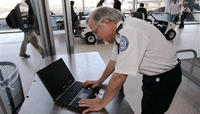-
Strikeout! Yankees release ticket holders' personal data
Apple and Google, Sony and Microsoft have all made news with security failures in the last weeks; the venerable New York Yankees baseball franchise now joins that list with the release of personal information of half of their season-ticket holders; this is but the latest example of cyber vulnerability owing to human fallibility
-
-
Sony's gaming network hacked, Microsoft's follows suit

Gamers are in a frenzy over Sony’s announcement that its PlayStation network security had been breached, resulting in the exposure of a large amount of each user’s personal and financial information; the first of an expected flood of lawsuits, as well as class action is filed in U.S. District Court; Microsoft announces an exploited vulnerability in one of their game titles leading to phishing attempts, and acknowledged that previously banned “modded” consoles were attaching to the network again
-
-
Google joins Apple in privacy furor
iPhones transmit locations back to Apple, and Apple is not alone in this activity; Google has disclosed that its Android cell phones have been transmitting location data for some time; members of the Congress and Senate have begun to demand answers and explanations
-
-
Android apps send private data in the clear

Cell phones running the Android operating system fail to encrypt data sent to and from Facebook and Google Calendar, shortcomings that could jeopardize hundreds of millions of users’ privacy; Facebook’s recently unveiled always-on SSL encryption setting to prevent snooping over insecure networks — but the encryption is no good, meaning that all private messages, photo uploads, and other transactions are visible to eavesdroppers
-
-
Woman wins payout after screener exposed her breasts
U.S. woman was awarded a nominal sum from the government after a TSA pat down exposed her breasts; in May 2008, Lynsie Murley was singled out for an extended search during which agents pulled down her shirt and exposed her breasts; the agents then laughed and joked about the incident
-
-
TSA: Religion offers no exemption from airport screening

An airline passenger was thrown out of the San Diego airport for rejecting a full-body scan and pat-down groin check and instead insisting on passing through a metal detector; the Transportation Security Administration (TSA) says the agency will not allow airline passengers to get out of body imaging screening or pat-downs based on their religious beliefs; TSA chief John Pistole said that passengers who refuse to go through a full-body scanner machine and reject a pat-down will not be allowed to board, even if they turned down the in-depth screening for religious reasons; “That person is not going to get on an airplane,” Pistole said yesterday in a congressional committee testimony
-
-
U.S. snoops scan the Web for potential terror risks
The U.S. government created a special center prior to Barack Obama’s inauguration for analyzing oceans of data passing through Facebook, Twitter, and other sites in an attempt to identify hazards; personnel at DHS’s National Operations Center scan the Web using dozens upon dozens of key search terms and phrases, among them “militia,” “cops,” “riot,” “dirty bomb,” “Mexican army,” “decapitated,” “Iraq,” “radicals,” and many more
-
-
Law enforcement agencies dig deeper into applicants' digital past
More and more police departments are digging deep into the social media accounts of applicants, requesting that candidates sign waivers allowing investigators access to their Facebook, MySpace, YouTube, Twitter, and other personal spaces; some agencies are demanding that applicants provide private passwords, Internet pseudonyms, text messages, and e-mail logs; of “particular concern” to law enforcement agencies is that defense lawyers could use officers’ posts to undercut their credibility in court
-
-
Cybersecurity only bright spot among disappointing administration privacy grades
The Electronic Privacy Information Center (EPIC) gave the Obama administration a “B” grade on its cybersecurity efforts; the 2010 report card shows declining grade — relative to 2009 — for the administration efforts in the cyber privacy areas; EPIC gave President Obama a dismal “D” on civil liberties in 2010, compared to a “C+” in 2009
-
-
Briton gets 4-months jail for refusing to disclose password
A 19-year old Briton used a 50-charcter password to protect child pornography files he kept in his computers; the court ordered him to reveal the password, but he refused and was sentenced to sixteen weeks imprisonment
-
-
School settles lawsuits over secret photos for $610,000
A suburban Philadelphia school district, which admitted earlier this year to capturing 56,000 secret Webcam photos and screenshots on school-issued laptops, has agreed to pay $610,000 in settlements; the intimate pictures of students in their bedrooms were taken by Webcam installed on laptops which the school loaned the students
-
-
U.S. to make Internet wiretaps easier

The Obama administration plans to submit a bill next year that would require all online services that enable communications to be technically equipped to comply with a wiretap order; this would include providers of encrypted e-mail, such as BlackBerry, networking sites like Facebook, and direct communication services like Skype; federal law enforcement and national security officials say new the regulations are needed because terrorists and criminals are increasingly giving up their phones to communicate online
-
-
Privacy-focused alternative to Facebook launched
Four NYU students launch Diaspora — a privacy-sensitive alternative to Facebook; Diaspora is a decentralized social network that lets users control their personal data — photos, friend lists, statuses, etc. — by hosting it on their own computers, or on servers they have access to, which are called “seeds”
-
-
New upgrades will make full-body scanners less privacy-offensive
New software upgrade to full-body scanners would replace the images of a passenger’s naked body with an avatar and alert authorities to a potential hidden threat, eliminating the need to keep an employee in a remote room
-
-
New legal challenge to DHS laptop searches at U.S. border

The Obama administration has continued a Bush administration policy which permits officers at U.S. borders to detain travelers’ laptop computers and examine their contents even without suspecting the traveler of wrongdoing — or, in the language of DHS policy, “absent individualized suspicion”; in a federal lawsuit filed Tuesday in the Eastern District of New York, the plaintiffs allege that DHS policy of substituting “search at will” for “reasonable suspicion” violates constitutional rights to privacy and free speech
-
- All
- Regional
- Water
- Biometrics
- Borders/Immig
- Business
- Cybersecurity
- Detection
- Disasters
- Government
- Infrastructure
- International
- Public health
- Public Safety
- Communication interoperabillity
- Emergency services
- Emergency medical services
- Fire
- First response
- IEDs
- Law Enforcement
- Law Enforcement Technology
- Military technology
- Nonlethal weapons
- Nuclear weapons
- Personal protection equipment
- Police
- Notification /alert systems
- Situational awareness
- Weapons systems
- Sci-Tech
- Sector Reports
- Surveillance
- Transportation
Advertising & Marketing: advertise@newswirepubs.com
Editorial: editor@newswirepubs.com
General: info@newswirepubs.com
2010-2011 © News Wire Publications, LLC News Wire Publications, LLC
220 Old Country Road | Suite 200 | Mineola | New York | 11501
Permissions and Policies
Editorial: editor@newswirepubs.com
General: info@newswirepubs.com
2010-2011 © News Wire Publications, LLC News Wire Publications, LLC
220 Old Country Road | Suite 200 | Mineola | New York | 11501
Permissions and Policies
